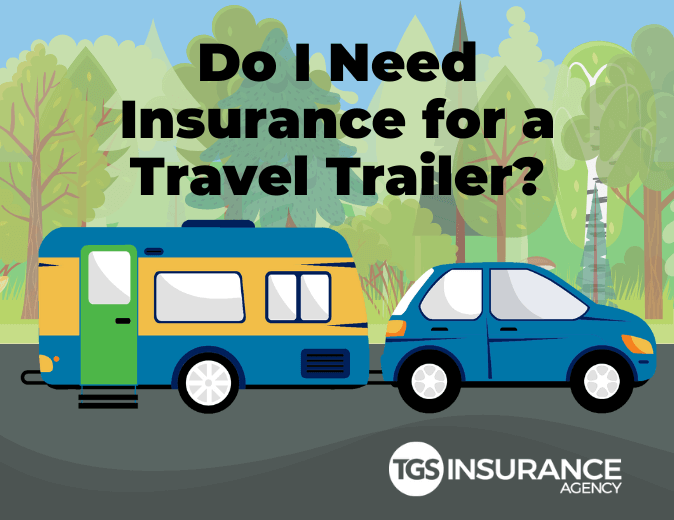How Much to Insure Travel Trailer: vary widely, typically ranging from $200 to $3,000 annually. Factors like the trailer’s value, size, and usage impact the insurance rates.

Travel trailers offer a convenient and cost-effective way to explore and enjoy the great outdoors, but just like any other valuable asset, they require protection. Insurance for your travel trailer is not just a legal necessity in many states; it is also a financial safety net for your adventures.
Whether you own a modest camper or a luxurious fifth-wheel, the right insurance policy safeguards against unexpected events such as accidents, theft, or natural disasters. By considering the value of the trailer and the level of coverage needed, owners can find an insurance plan that provides peace of mind without breaking the bank. Tailoring your coverage to your specific needs ensures that you are only paying for what you need, keeping your expenses in check while you roam freely.

Introduction to How Much to Insure Travel Trailer:
Embarking on a journey with a travel trailer unlocks the door to adventure and creates lifelong memories. But before you hit the road, understanding the ins and outs of travel trailer insurance is essential. It’s not just about safeguarding your home-on-wheels; it’s about ensuring peace of mind as you explore the unknown.
Why Insure Your Travel Trailer?
Insuring your travel trailer acts as a safety net for the unexpected. Here’s why it’s crucial:
- Protection against accidents: Cover costs from collisions or road mishaps.
- Shield from natural disasters: Financial security if nature strikes.
- Theft and vandalism: Get compensated for loss or damage.
- Peace of mind: Travel with confidence, knowing you’re covered.
Common Types Of Coverage
Various insurance options cater to different needs. Common coverages includes:
| Coverage Type | Description |
|---|---|
| Liability | Pays for damage or injuries you cause. |
| Collision | Covers trailer repairs after an accident. |
| Comprehensive | Protects against theft, fire, and other risks. |
| Contents | Insures belongings inside your trailer. |
| Emergency Expenses | It helps with costs if your trailer is unusable. |

Factors Affecting Insurance Costs
Understanding the cost of insuring a travel trailer is crucial for planning trips and managing budgets. The insurance premium depends on various factors. Each factor influences the final cost of insuring a travel trailer. Let’s explore these factors in detail.
Age And Condition Of Trailer
The age and condition of your travel trailer play a significant role in determining insurance costs. Insurers consider newer models to be less risky. They are less likely to encounter mechanical failures. Older trailers might need more repairs, which could attract higher premiums. The condition is equally important. A well-maintained trailer could benefit from lower insurance rates. On the other hand, one with wear and tear might cost more to insure.
Frequency And Duration Of Usage
How often you use your travel trailer and for how long each time can impact insurance costs. Occasional users may enjoy lower premiums. This is because their trailers face less exposure to potential risks. Regular travelers might see higher rates due to increased usage. The duration of each trip also matters. Longer trips might raise the likelihood of incidents. Insurers take this into account when setting premiums.
| Trailer Age | Condition | Insurance Impact |
|---|---|---|
| New | Excellent | Lower Premiums |
| Old | Good | Moderate Premiums |
| Very Old | Poor | Higher Premiums |
- Occasional Use: Less risk, potential for lower premiums.
- Regular Use: Higher risk, possible higher premiums.
- Extended Trips: Increased exposure to incidents, considered by insurers.
Types Of Travel Trailer Insurance Policies
Choosing the right insurance for a travel trailer is key for peace of mind on the road. Several policies protect against a variety of incidents. Understand the options to make an informed decision.
Comprehensive Coverage
Comprehensive coverage is like a safety net for your travel trailer. It covers unexpected events that aren’t collisions. Think of things like fire, theft, or weather damage. This coverage ensures your investment stays protected from almost all the surprises that can happen while stationary or traveling.
Collision Coverage
Collision coverage steps in when your travel trailer hits something, or something hits it. This could be another vehicle or even a stationary object. Collision coverage helps pay for repairs or replacements to your travel trailer, so accidents don’t put a stop to your adventures.
Liability Coverage
Liability coverage is essential. It’s about responsibility. If your travel trailer causes harm to others or damages property, liability coverage can save you from hefty out-of-pocket costs. This includes legal fees if you’re sued. It’s not just smart; in many places, it’s the law to have this coverage.
Calculating Your Premium
Getting the right insurance for your travel trailer is crucial. Calculating your premium need not be complex. Several factors determine how much you’ll pay. Understanding these can save you money and ensure adequate coverage.
Role Of Deductibles
A deductible is what you pay out of pocket on a claim before insurance kicks in. Higher deductibles can lower your premium. But remember, this means more expense during a loss. Choose a deductible that’s affordable and won’t strain your finances if an incident occurs.
Impact Of Add-ons And Modifications
Extras on your travel trailer may increase its value. This, in turn, can raise your premium. Special features like solar panels or custom interiors should be declared. Inform your insurer about modifications to ensure they’re covered. This may affect your premium, but it’s essential for full protection.
Note: Always review your policy details. Adjust coverage as needed. Safe travels!
Reducing Insurance Costs
Reducing insurance costs for your travel trailer doesn’t have to be complex. With the right strategies, you can enjoy the open road without the burden of hefty premiums. Let’s explore how selecting a higher deductible and bundling policies can lead to significant savings on your travel trailer insurance.
Choosing A Higher Deductible
Opting for a higher deductible can be a smart move to lower your insurance premiums. A deductible is the amount you pay out of pocket before your insurance kicks in. By choosing to shoulder more financial responsibility in the event of a claim, you signal to your insurer that you’re a lower risk, which can result in reduced costs on your policy.
- Lower premiums: Increasing your deductible often leads to immediate premium savings.
- Shared risk: It shows insurers you’re willing to share the risk, which can make you a more favorable client.
- Consider savings: Ensure you can afford the higher deductible if needed.
Benefits Of Bundling Policies
Insurance companies often reward customers who hold multiple policies with them. Known as policy bundling, this approach can lead to discounts and simplified management of your insurance needs.
| Type of Bundle | Potential Savings | Convenience |
|---|---|---|
| Auto + Travel Trailer | Discounts up to 10–20% | One insurer, less hassle |
| Home + Travel Trailer | Discounts vary by company | Streamlined policy management |
| Auto, Home + Travel Trailer | Maximum savings potential | single point of contact for claims |
Before you choose to bundle, compare offers from multiple insurers to ensure you’re getting the best deal possible. Remember, the goal is to maximize coverage while minimizing costs.
Insurance For Full-time Vs Part-time Users
Choosing the right insurance for your travel trailer is crucial. Whether you live in your trailer full-time or use it for occasional getaways, insurance needs differ. Full-time users face risks similathose faced byr to homeowners, while part-time users have unique considerations. Understanding these differences ensures you select the best policy for your lifestyle.
Coverage Differences
Full-time users need comprehensive coverage. Think of it as a home on wheels. It should cover personal belongings, liability, and living expenses if the trailer gets damaged.
Part-time users often require less coverage. They need to protect their trailer during trips and when it’s parked. Key aspects include collision, theft, and occasional liability.
- Full-time coverage:
- Personal property protection
- Liability similar to home insurance
- Additional living expenses
- Part-time coverage:
- Collision and comprehensive
- Theft and vandalism
- Travel-specific liability
Policy Recommendations
For full-time dwellers, a specialized RV policy is best. It acts like a homeowner’s policy. Part-time users might opt for an add-on to their auto insurance or a separate RV policy.
| User Type | Policy Type | Recommended Coverage |
|---|---|---|
| Full-time | Specialized RV Policy | Full coverage includes liability, personal property, and living expenses |
| Part-time | Auto Insurance Add-on or Separate RV Policy | Collision, comprehensive, theft, and occasional liability |
Check for policy discounts. Installing safety devices or taking safe driving courses can lower premiums. Always compare quotes from multiple insurers to find the best rate. Remember, the right insurance gives you peace of mind on every journey.
Claims And Payouts
Travel trailer insurance claims can be tricky. Understanding the process is crucial. Let’s dive into what happens when you file a claim and how payouts work.
Filing A Claim
Quick action is key after an incident with your travel trailer. Here’s what to do:
- Report the incident to your insurance company immediately.
- Document everything. Take pictures and note details.
- Complete all required forms promptly.
- Stay in touch with your insurance adjuster.
These steps help speed up the claim process.
Understanding Settlements
Insurance settlements can vary. The type of coverage you have plays a big role. Here’s a simple breakdown:
| Type of Coverage | What It Pays For |
|---|---|
| Comprehensive | Damage from theft, fire, or vandalism. |
| Collision | Damage from hitting an object or another vehicle. |
| Liability | Costs from damaging another’s property. |
Understanding your policy is crucial. It ensures you know what to expect financially.
Choosing The Right Insurance Provider
Choosing the right insurance provider is crucial for securing your travel trailer. It involves understanding various factors. This section helps you navigate this decision with clarity and confidence.
Comparing Quotes
Start by gathering quotes from multiple insurers. This gives you a clear picture of what each company offers. Use the following table to compare key aspects:
| Insurance Provider | Annual Premium | Coverage Limits | Deductibles |
|---|---|---|---|
| Provider A | $250 | $20,000 | $500 |
| Provider B | $300 | $25,000 | $600 |
| Provider C | $350 | $30,000 | $700 |
Look for the best balance between cost and coverage.
Reading Reviews And Ratings
Check reviews and ratings for insights on customer satisfaction. Focus on these points:
- Customer service experiences
- Claims processing efficiency
- Overall customer satisfaction
Use reliable sources, like industry watchdogs and consumer feedback platforms. This ensures the information is trustworthy.

How much to insure travel trailer per month
The cost to insure a travel trailer per month can vary based on factors such as the trailer’s value, age, size, and intended use, as well as the owner’s location and driving record. On average, monthly
premiums for travel trailer insurance range from $20 to $50 for basic coverage, which typically includes liability, collision, and comprehensive protection. More extensive coverage options, such as personal
Replacement, emergency expenses, and higher liability limits, can increase the monthly cost to between $60 and $100 or more. To find the best rates, it’s important to compare quotes from multiple insurers and consider bundling with other insurance policies for potential discounts.
Travel trailer insurance cost calculator
A travel trailer insurance cost calculator is a useful online tool that helps prospective policyholders estimate their monthly or annual insurance premiums based on various factors. By inputting details
such as the travel trailer’s make, model, year, and value, as well as the owner’s location, usage frequency, and desired coverage levels, the calculator provides an approximate cost of insurance.
This tool typically considers additional factors like the owner’s driving history, security features on the trailer, and any previous claims. Using a travel trailer insurance cost calculator can simplify the process
of budgeting for insurance and helping owners compare different coverage options to find the best policy to suit their needs and financial situation.
Frequently Asked Questions
Is Travel Trailer Insurance Worth It?
Travel trailer insurance is generally worth it, providing financial protection against accidents, theft, and natural disasters. It offers peace of mind for owners on the road.
What Kind Of Insurance Do I Need For A Travel Trailer?
You’ll need liability insurance It is frequently required by law that you obtain liability insurance for your travel trailer. Consider comprehensive and collision coverage for protection against theft, damage, and accidents. Optional coverage includes contents insurance for personal belongings and roadside assistance for emergencies.
What Is The Cheapest Insurance For Campers?
The cheapest insurance for campers varies based on individual needs. To find the most affordable options, compare quotes from multiple providers and consider liability-only policies for older models.
Do You Need Collision Insurance On A Travel Trailer?
Collision insurance for a travel trailer is not mandatory but is highly recommended to protect against damages from accidents while towing or stationary.
Conclusion
Determining the right insurance for your travel trailer needn’t be a daunting task. By considering factors such as value, usage, and location, you can find a policy that offers peace of mind without breaking the bank. Remember, the right coverage ensures your adventures remain carefree and enjoyable.
Safe travels, and happy camping!

Hello and welcome to HealthcareInsuranceNews.com! I’m Emon Sheikh, and I’m thrilled to be your guide through the intricate world of healthcare insurance.
As a dedicated blog writer focusing on healthcare insurance, I’m passionate about helping individuals navigate the complexities of insurance policies, understand their coverage options, and make informed decisions to protect their health and finances.
With a background in Life Insurance, Travel Insurance, Medical Insurance, Pet Insurance, Students Insurance, Cancer Insurance, I bring a wealth of knowledge and insights to my writing. Through my blog posts, I aim to demystify insurance jargon, provide practical tips, and keep you up-to-date on the latest developments in the healthcare insurance landscape.
Whether you’re a seasoned insurance professional, a healthcare provider, or someone simply seeking guidance on finding the right insurance plan, I’m here to provide valuable information and support. Together, let’s unravel the complexities of healthcare insurance and empower you to take control of your healthcare journey.
Thank you for visiting HealthcareInsuranceNews.com, and I look forward to sharing this journey with you!
Best regards,
Emon Sheikh
